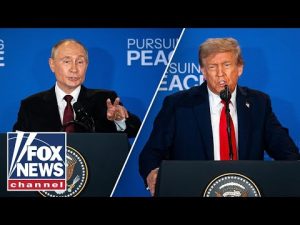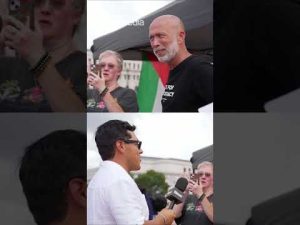### A Clash of Perspectives: A Heated Exchange on Public Property
In a lively exchange that could have easily been plucked from a script for a dramatic television show, two passionate individuals faced off in what can only be described as a spirited debate. This encounter took place on public property, where one party was emphatically expressing their opinions while the other felt their background and identity were being unfairly criticized. The situation, fraught with tension, was emblematic of a broader national dialogue that is often more about emotion than understanding.
The core of the disagreement seemed to revolve around job security and personal accountability. On one side, a bold speaker challenged a passerby who appeared to be working for an organization they deemed oppressive, urging them to “get a better job.” The comment was sharp and provocative, echoing a sentiment that many hold—that everyone should strive for better opportunities, regardless of their current situation. However, as the speaker pointed out this opportunity, the interaction took a twist when race was brought into the equation.
This sparked further debate as the individual being confronted indicated their Latino heritage, questioning the implications of the original speaker’s remarks. The exchange quickly turned into an examination of racism and responsibility, with both parties trying to clarify their positions. Was it inherently racist to suggest that someone leave their job? Was it fair to single out one’s ethnicity while discussing employment? The questions floated like butterflies in a summer breeze, light yet suffused with deeper meanings.
As tensions rose, the discussion veered into complicated territory. With both persons standing their ground, the urgency of their feelings became palpable. The speaker maintained that their critique of the job choice was made without regard to race, asserting their point passionately. This encounter highlighted a pervasive theme in today’s society: how personal identity influences conversations about social issues. It’s a bit like bringing a spoon to a knife fight; everyone has a different weapon, which sometimes leads to more misunderstanding than resolution.
In the end, the debate concluded without clear winners—a reflection of many discussions in our time. As they parted ways, it was perhaps a reminder that every person carries a unique story, shaped by their experiences, and that understanding is key in bridging the divide. While one may walk away feeling victorious, the real victory lies in the ability to engage in dialogue. After all, open discussions about jobs, identity, and society are fundamental to democracy, even if they sometimes feel more like a dance-off than a discussion.
In a world where public discourse often resembles a chaotic marketplace, it’s important to keep personal stories and experiences at the forefront. A reminder, perhaps, that amidst all the clamor, finding a middle ground—an opportunity for mutual understanding—is not just preferable but essential for progress. After all, sometimes the most illuminating discussions come from those who are brave enough to engage in the unexpected.







